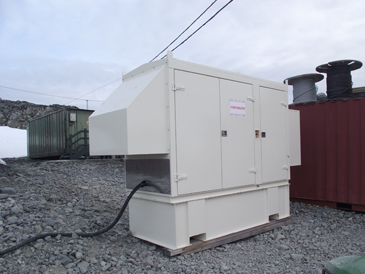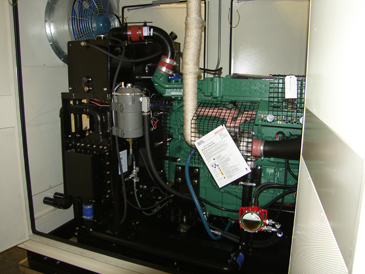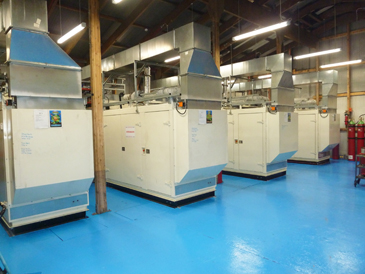A Westac Power generator sits in its temporary location outside the British Antarctic Survey’s Rothera Research Station on Adelaide Island, on the Antarctic Peninsula, before being moved into an insulated shed.
Despite the coldest temperatures on the planet, Volvo Penta engines are proving their reliability by helping to keep an Antarctic research facility powered up – and warm – around the clock.
It's the coldest, harshest environment on the planet. With near-total darkness for six months of the year and temperatures plummeting in some places to a mind-boggling -90° C, Antarctica is the Earth's final frontier.
The British Antarctic Survey (BAS) has been researching the icy continent for the past 60 years, with more than 400 staff working from headquarters in Cambridge, England, as well as at its three stations in Antarctica and two on the nearby island of South Georgia.
At the Rothera station on Adelaide Island, 1,860 km south of the Falkland Islands, more than 100 scientists and support staff can be found living and working in the summer months, with a skeleton crew of around 22 staying on through the winter. The station is used for the study of marine and terrestrial biology, geology, glaciology, meteorology and upper atmospherics. With so many people living in such unforgiving conditions, it's vital to keep the station up and running at all times, supplying heat and hot water and allowing staff to maintain a relatively normal standard of living — even on a remote, frozen continent.
A warmer climate
Westac Power, a UK-based engine generator set manufacturer, has been working with BAS for the past 15 years, supplying gen-sets to several of the organization’s Antarctic research bases. Westac Power has been in business since 1993 and specializes in making bespoke gen-sets tailored to its customers’ unique needs.
Last autumn, Westac Power built six new gen-sets for the Rothera station, which were delivered, installed and operational by February this year. Three of the gen-sets are used as primary power sources, fueling the everyday activities of the camp, while one is used as an emergency standby. The two other units were used for power during the construction and changeover phase.
Volvo engines were selected as the most suitable for this application – in this case, TAD752GE Tier 3 engines with a 200 KVA output.
“We’ve been using Volvo Penta since Westac Power was founded, and we’ve come to rely upon its engines as being extremely robust,” says Tony Shirtliff, chairman of Westac Power. “We’ve found that their performance is usually even better than published – in fact, we’re often surprised at what we get out of them.”
A Volvo Penta TAD752GE Tier 3 engine with 200 KVA output is pictured in one of the Westac Power generators at Rothera.
Temperatures down, uptime up
Engine reliability is always important, but nowhere is that more true than in Antarctica. Getting aftermarket support is more difficult at such a tremendous distance, and parts can take weeks to arrive – that’s if they are able to be shipped at all, since the Rothera station is completely inaccessible by plane or boat from March to October.
Westac Power provides technical support to the Antarctic stations via mobile phone and email, but prior to installing the newest gen-sets, Rothera’s engineers visited Westac Power to learn exactly how to set up and run the gen-sets. “The learning curve is huge on a project like this,” says Westac Power's engineering manager, Richard Ridley. “We went through the installation process in detail, and they were able to replicate it in Rothera. The commissioning was carried out without major issues, and that’s part of the reason why.”
Westac Power, in turn, relies on Volvo Penta for support. Since there’s no dealer in Antarctica, Westac Power has arranged for additional assistance, information and training directly from the company. “Volvo Penta provides us with all the technical information we could ever need,” Shirtliff says. “We’ve always found them to be an excellent partner.”
The Westac Power generators sit in a shed at the Rothera station in Antarctica.
In from the cold
Perhaps somewhat surprisingly, given the extreme conditions, there’s very little preparation Westac Power has to do to make sure the engines stay up and running at Rothera. “We use Volvo Penta engines in Antarctica because we know they’ll work there without any fuss – after all, they’re built to run in Northern Scandinavia,” says Ridley. “Provided you put the correct amount of coolant in them, keep them warm enough and don't try to start them when they’re too cold, they run perfectly.”
Besides reliability and excellent aftermarket service, Ridley and Shirtliff also cite Volvo Penta engines’ superior airflow, low noise and low emissions levels – especially crucial for an environmental research center like BAS.
Add up all these factors, and ultimately, Westac Power's relationship with Volvo Penta comes down to dependability. “We trust Volvo Penta engines,” Ridley says. “In these conditions, we have every confidence in their ability to perform.”
For more information, please contact:
Åke Edman
Director of Communications
AB Volvo Penta
Tel: int +46 (0) 31 322 51 90
E-mail: [email protected]
Christin Runkle
SE10 London
Tel: int +44 (0) 207 107 2012
Email: [email protected]


